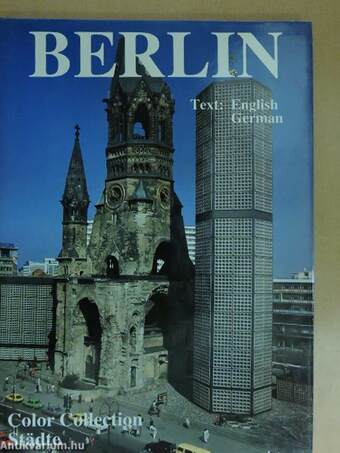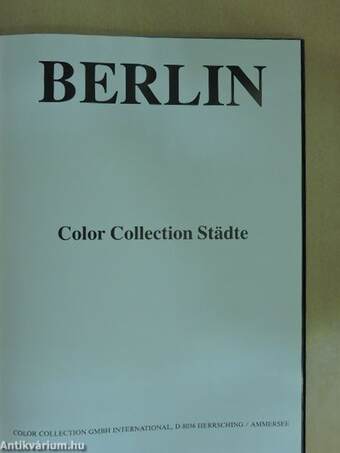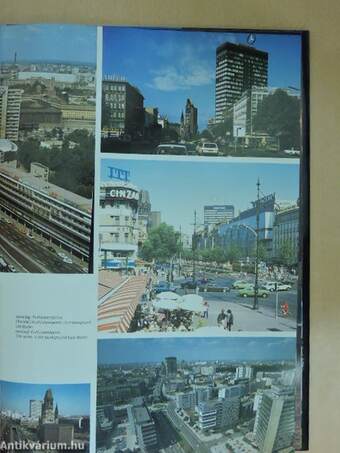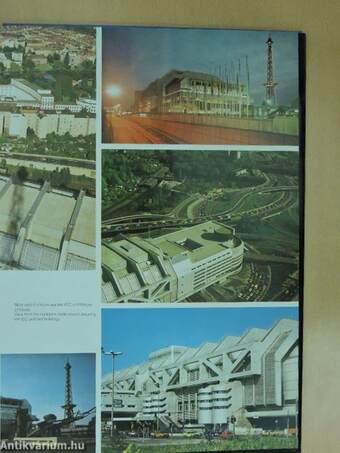1.059.898
kiadvánnyal nyújtjuk Magyarország legnagyobb antikvár könyv-kínálatát

VISSZA
A TETEJÉRE
JAVASLATOKÉszre-
vételek
Berlin
| Kiadó: | Color Collection GmbH International |
|---|---|
| Kiadás helye: | Herrsching |
| Kiadás éve: | |
| Kötés típusa: | Varrott keménykötés |
| Oldalszám: | 94 oldal |
| Sorozatcím: | Color Collection Städte |
| Kötetszám: | |
| Nyelv: | Német Angol |
| Méret: | 32 cm x 23 cm |
| ISBN: | 3-88674-014-5 |
| Megjegyzés: | Színes fotókkal gazdagon illusztrálva. |
naponta értesítjük a beérkező friss
kiadványokról
naponta értesítjük a beérkező friss
kiadványokról
Előszó
TovábbFülszöveg
Berlin
Berlin is a surprising city. Through force of political circumstance, the greater part of It has no hinterland, so people who have never been there imagine a steel and concrctc jungle, all soulless modem buildings and urban congestion. In fact, Berlin's many-faceted personality is much more varied than that.
It has the busy, confident air of a cosmopolitan metropolis, but the peace and quiet its beauty spots can olTcr are far more than mere oases in the urban sprawl. Over a third of Berlin is parkland or waterway, the forests which fringe the city to the west are extraordinarily quiet and their air sparklingly fresh, and the rivers with their attendant lakes that water the city offer sun,'iiand and delightful recreational facilities to all BeHiners.
Beriin can extend the same uncomplicated, jovial, beermugin-hand welcome to its visitors that many think of as typically German, but it can also produce a more sophisticated approach, based on the knowledge that its cultural... Tovább
Fülszöveg
Berlin
Berlin is a surprising city. Through force of political circumstance, the greater part of It has no hinterland, so people who have never been there imagine a steel and concrctc jungle, all soulless modem buildings and urban congestion. In fact, Berlin's many-faceted personality is much more varied than that.
It has the busy, confident air of a cosmopolitan metropolis, but the peace and quiet its beauty spots can olTcr are far more than mere oases in the urban sprawl. Over a third of Berlin is parkland or waterway, the forests which fringe the city to the west are extraordinarily quiet and their air sparklingly fresh, and the rivers with their attendant lakes that water the city offer sun,'iiand and delightful recreational facilities to all BeHiners.
Beriin can extend the same uncomplicated, jovial, beermugin-hand welcome to its visitors that many think of as typically German, but it can also produce a more sophisticated approach, based on the knowledge that its cultural credentials are second to none.
Even more important in Berlin's present-day make-up is the fact that it is the largest city in Germany, fine-looking, culturally vigorous and seemingly always in the middle of enjoying some festival or happening. At first glance, this is the most surprising aspect of all about the place. In the years immediately after Worid War II, Beriin had all the appearance of a city which had been left out in the cold, with the greater part of il still nominally part of democratic West Germany but cut olV from it so that its roots must surely wither in the cooler climate of communist East Germany. The Beriin .Airlift of 1948-9 wis triumphantly lo prove the contrary.
In fact, Beriin is a survivor. Both cast and west of the dividing line, they have cleared away the wartime rubble
- in West Beriin they have landscaped it into hills they use as skiing grounds in winter - refurbished the old buildings that could be saved from the wreckage and put up new ones in the gaps. The three million Beriiners
- about two million in West Beriin and one million
in East Beriin - have not just papered over the cracks; they have got on with the business of living, optimislically ' and with a beliefin the future oftheir city.
There is one aspect of the city, however, which sets it apart from others which have had to start again after the devastations of war, and that is that Beriin has bccomc a symbol of the reason for the Cold War. „Ich bin ein Beriiner" said President Kennedy in 196.1, meaning IIku he was for democracy and a free world and against Ihc oppression ofcommunism. Vissza
Témakörök
Megvásárolható példányok
Nincs megvásárolható példány
A könyv összes megrendelhető példánya elfogyott. Ha kívánja, előjegyezheti a könyvet, és amint a könyv egy újabb példánya elérhető lesz, értesítjük.











